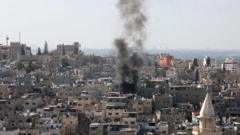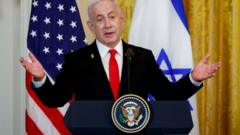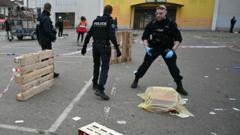Israeli forces have expelled residents from refugee camps amid a heightened military operation in the West Bank, resulting in large-scale displacement and tension in the region.
Israel's Major Operation Leads to Expulsion of Refugees From Three West Bank Camps

Israel's Major Operation Leads to Expulsion of Refugees From Three West Bank Camps
Israel increases military presence in the West Bank as thousands are forced to evacuate from refugee camps, drawing condemnation from Palestinian authorities and the UN.
Israel has undertaken a significant military operation in the northern West Bank, resulting in the expulsion of residents from three refugee camps in Jenin, Tulkarm, and Nur Shams. According to Israeli Defence Minister Israel Katz, these camps are now designated to remain "empty" as the Israeli military establishes a prolonged presence in the area for at least a year, purportedly to prevent the return of residents and combat terrorism.
Since the operation commenced on January 21 and escalated notably in recent weeks, the UN reported that around 40,000 Palestinians have been forcibly displaced. The Israeli Defense Forces (IDF) have mobilized a tank division around Jenin for the first time since 2002, marking a notable escalation in military activities.
In a public statement, Katz emphasized the primary objective of this operation as “thwarting terrorism,” while the IDF extended its offensive tactics to include various military resources like drones and special forces. In a response to the current situation, Palestinian Authority spokesman Nabil Abu Rudeineh denounced the military's actions, labeling them a "dangerous Israeli escalation" that would not foster stability or peace.
The Israeli offensive has reportedly resulted in significant casualties; the UN reported 51 Palestinian fatalities, among them seven children, in addition to three Israeli soldiers since the operations began. Furthermore, infrastructure damage has severely impacted access to water, affecting tens of thousands of local residents.
Israeli Prime Minister Benjamin Netanyahu visited the Tulkarm refugee camp to oversee operations and has ordered an intensification of military activity, responding to recent violence exemplified by suspected terrorist bombings in Tel Aviv. Despite international views that deem settlements in the West Bank illegal, Israel maintains its stance on these territories following their occupation during the 1967 Six Day War. The ongoing military campaign and refugee expulsion highlight the complex and contentious nature of the Israeli-Palestinian conflict, with implications that may shape future dialogue and peace efforts in the region.
Since the operation commenced on January 21 and escalated notably in recent weeks, the UN reported that around 40,000 Palestinians have been forcibly displaced. The Israeli Defense Forces (IDF) have mobilized a tank division around Jenin for the first time since 2002, marking a notable escalation in military activities.
In a public statement, Katz emphasized the primary objective of this operation as “thwarting terrorism,” while the IDF extended its offensive tactics to include various military resources like drones and special forces. In a response to the current situation, Palestinian Authority spokesman Nabil Abu Rudeineh denounced the military's actions, labeling them a "dangerous Israeli escalation" that would not foster stability or peace.
The Israeli offensive has reportedly resulted in significant casualties; the UN reported 51 Palestinian fatalities, among them seven children, in addition to three Israeli soldiers since the operations began. Furthermore, infrastructure damage has severely impacted access to water, affecting tens of thousands of local residents.
Israeli Prime Minister Benjamin Netanyahu visited the Tulkarm refugee camp to oversee operations and has ordered an intensification of military activity, responding to recent violence exemplified by suspected terrorist bombings in Tel Aviv. Despite international views that deem settlements in the West Bank illegal, Israel maintains its stance on these territories following their occupation during the 1967 Six Day War. The ongoing military campaign and refugee expulsion highlight the complex and contentious nature of the Israeli-Palestinian conflict, with implications that may shape future dialogue and peace efforts in the region.



















